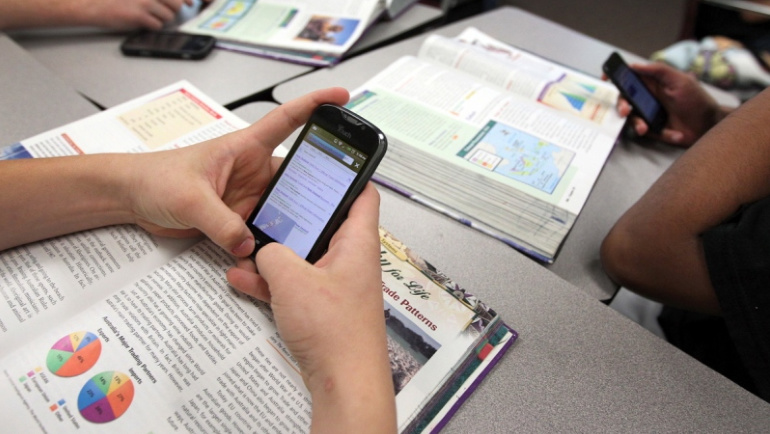
It’s no secret that people seem to have a hard time putting their phones down. Researchers from Wayne State University sought to find out why college students are particularly susceptible to distracted phone use.
Julia Briskin, Wayne State University graduate student and doctoral candidate in psychology; Tim Bogg, WSU associate professor of psychology; and Jesse Haddad, a student at the Wayne State School of Medicine, recently published an article in Frontiers in Psychology entitled, “Lower Trait Stability, Stronger Normative Beliefs, Habitual Phone Use and Unimpeded Phone Access Predict Distracted College Student Messaging in Social, Academic, and Driving Contexts." Their research focused on three contexts where phone use is often a source of distraction — in the classroom, eating with others and driving — and which personality traits are associated with problematic messaging behavior.
The inception of the research stemmed from Haddad’s personal observations of phone use. In the winter of 2016, his interest was further developed into a thesis paper for a psychology course taught by Bogg. During the summer of 2016, Haddad began working with Briskin, whose background interest in “technoference” — the interference of technology in relationships — was ideal for this type of research. The research was ultimately conducted using data from more than 600 Wayne State students over the course of two years.
“There are specific traits that seem to contribute to increased phone-related habits and to increased accessibility to your phone,” said Briskin. The team’s research showed that greater anxiety, lower self-discipline, and lower altruistic or selfless tendencies were associated with greater distracted messaging.
Another important factor of habitual phone use is peer influence. “It appears that what your peers believe about phone use really influences how much you will engage in distracted messaging behavior,” said Briskin. “What you think your friends believe [about phone use] really influences your phone behavior. Your habitual phone use — how automatic it is for you — also strongly influences how much you engage in distracted messaging behavior.”
Just because you engage in distracted messaging behavior doesn’t mean that you are highly undisciplined or anxious. Accessibility to your phone can also result in habitual phone use and distracted messaging behaviors. How close your phone is to you, in combination with certain personality traits, can affect your susceptibility to habitual messaging behaviors.
If habitual distracted phone use is an issue, Briskin and Bogg agree that isolating yourself from your phone is one way to decrease problematic distracted phone use. Setting and following rules about phone usage or having “switched off” time can make an impact.
“I know I cannot completely change people's habits, but to help contribute to understanding why people's habits are the way they are could be a step toward a more mindful life experience,” said Haddad. “The findings of our study can contribute to programs or services designed to limit inappropriate phone use or just give people the necessary strategies to better control the intrusion of their phones in their lives if they choose to do so.
“Being more ‘mindful’ moment-by-moment can help people make better decisions,” continued Haddad. He added that being more mindful “can help people appreciate things and people more, which could work together to [help people] lead a more joyful and healthy lifestyle.”
